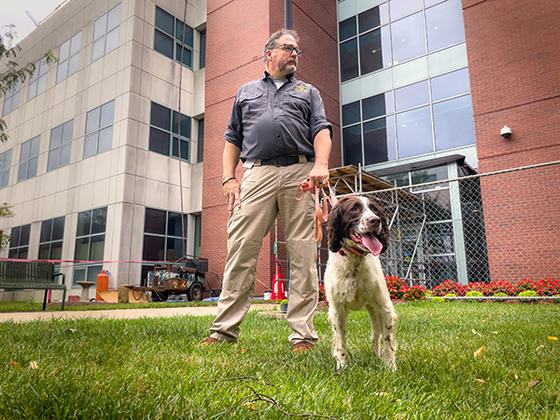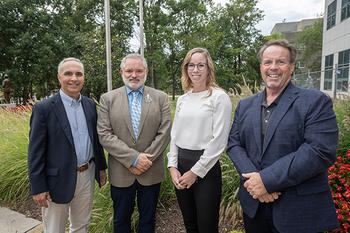Walking into a lecture hall to a PowerPoint about a homicide is startling for those unacquainted with the intricacies of forensic sciences. For an audience of medical examiners, law enforcement, and prosecutors at the 2023 National Center on Forensics Conference, it’s just another day on the job.

Photo by Sarah Holland/George Mason University
The conference was the culminating event of the National Institute of Justice’s $2 million grant to George Mason University and its partners to create the National Center on Forensics. With sessions on topics like “Challenges in Homicide Cases Involving Native Americans and Rural Areas,” and discussions of new methodologies like genetic genealogy and the role of canines in the investigative process, the conference aimed to help a wide community of medical and legal practitioners in rural areas learn how to solve these efficiently and effectively utilizing current forensic analysis techniques.
“Smaller agencies—like those in rural areas—don't have the resources to get the same level of training on emerging techniques and technologies as those agencies in urban areas like Fairfax County,” said Joseph DiZinno, associate professor of forensic science at Mason and PI on the grant. “We hope to remedy that through events like this conference.”
“Introducing rural departments to new technologies and methodologies and demonstrating their implementation has already had a huge impact,” said Kayla Wallace, coroner liaison for the Montana Forensic Science Division, one partner on the grant. “Many of our attendees have not had access to these tools before, and we hope to see them continue to implement in the future.”
Attendees at the conference at the SciTech Campus heard from experts in forensic pathology, several areas of forensic science, and criminal law like Cece Moore, leading genetic genealogist; Minnesota Attorney General Keith Ellison, who served as special prosecutor for the Derek Chauvin case; and Matthew Gamette, laboratory system director for the Idaho State Police Forensic Services, who worked on the recent Idaho State murders case.
To ensure that as many practitioners as possible have access to this education and training, conference panels were recorded and will be available online.

Photo by Evan Cantwell/George Mason University
“Our rural attendees don’t have many opportunities to talk to other practitioners about the complex issues and challenges they face," said Dan Milner, consultant pathologist for the American Society of Clinical Pathologists—one of the grant partners—and executive director of the Access to Oncology Medicines Coalition. “There’s a lot of discussion after the sessions and lots of questions being asked, both with panelists and amongst the attendees. They're really taking advantage of being in the same room as their colleagues.”
Mike Kuykendall, director of the Center for Excellence in Governance at the National Association of Attorneys General, the third partner on the grant, noted the importance of networking the conference provided. “The contacts they’ve made here can impact the rest of their careers.”
In addition to engaging medico-legal practitioners, the conference provided experiential learning opportunities for forensic science students at Mason through the planning and running of the conference. Students had the opportunity to build their resumes, hear directly from renowned experts, and meet active practitioners in all areas of forensic science.
“To be around experts and active practitioners so early in my career was surreal,” said Mariana Cruz, BS Forensic Science ’23, who is currently working on her master’s in forensic science. “I was making incredible connections, as well as really seeing how every part of the process—from medical examiners up through the court systems—must work together to solve these cases.”
Lorena Garcia, a junior in Mason’s forensic science program who grew up near a rural area in North Carolina, has firsthand experience seeing the discrepancies in resources between urban and rural offices. “This conference was so important because rural sheriffs have little to no funding and so many barriers,” she said. Garcia has made friends within the sheriff’s office of her hometown of Smithfield, and when she returned home after the conference, she said, “One of the officers told me I was learning more than some of the people in the office had experienced in their lifetime. She told me, ‘You’re going to change the world.’”
Related Stories
- November 13, 2024
- March 21, 2024
- January 11, 2024
- December 5, 2023
- At Mason-led conference, forensic science experts offer training and insight for rural practitionersSeptember 14, 2023
